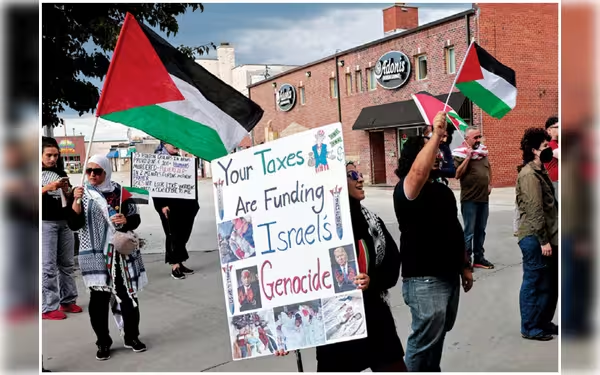Tuesday, November 26, 2024 12:52 AM
Arab Americans Urged to Engage with Trump Administration
- Shift from boycott to engagement proposed by community leaders.
- Dialogue seen as essential for addressing Arab American issues.
- Negotiation preferred over boycotting for political influence.
 Image Credits: arabnewspk
Image Credits: arabnewspkArab Americans are encouraged to engage with the Trump administration to influence policy and address community issues.
In recent discussions surrounding the Arab American community's response to the Trump administration, a significant shift in strategy has been proposed. Prominent figures within the community are advocating for engagement rather than the boycott tactics that were prevalent during Donald Trump’s first term as president. This call for dialogue comes amidst ongoing conflicts in the Middle East, particularly in Gaza and Lebanon, and highlights the complexities of navigating political relationships in a charged environment.
Ned Fawaz, a leading Arab American businessman from Michigan, has been vocal about the need for Arab and Muslim communities to abandon their previous boycott strategies. He emphasizes that engaging with the administration is crucial for addressing pressing issues that affect both the Arab American community and the broader geopolitical landscape. Fawaz stated, "It’s bad to boycott. After all, we’re American. We have issues (other than just) the Middle East as well. And I think we should all dialogue and talk, and be ready to communicate with the president, with any administration, because we cannot just sit aside and do nothing." This perspective underscores the importance of participation in the political process, even when faced with challenging circumstances.
On the other hand, David Chami, a civil rights attorney from Arizona, has raised concerns about the rise of anti-Arab racism and Islamophobia, which he believes complicates the call for engagement. He, along with Fawaz, argues that while Trump’s administration has been polarizing, it is essential for the community to prioritize dialogue over boycotts. They believe that through constructive engagement, Arab Americans can influence U.S. policy and advocate for peace, particularly regarding the Israeli-Palestinian conflict.
Fawaz further elaborated on the importance of negotiation, stating, "Yes, always, negotiation makes better sense than boycotting. We believe in evolution. We do not believe in revolution. So, that’s the way it should be." This sentiment reflects a desire for a more proactive approach to political engagement, suggesting that Arab Americans should seize every opportunity to advocate for their interests and push for solutions like the two-state solution for Palestinians.
Despite the controversial nature of Trump’s presidency, some within the Arab American community view him as a potential ally in resolving the Gaza conflict. A pre-election survey indicated that many believed Trump was best equipped to address the ongoing violence, despite his administration's strong ties to Israel. This perspective highlights the complexities of political allegiance and the necessity for Arab Americans to navigate their interests carefully.
As the geopolitical landscape continues to evolve, recent developments, such as the International Criminal Court's issuance of arrest warrants for Israeli officials, add further layers of complexity to the situation. The U.S. government's strong condemnation of the ICC's decision reflects its unwavering support for Israel, which has drawn criticism from various quarters. Fawaz acknowledges the challenges posed by Trump’s cabinet selections, many of whom hold pro-Israel views, yet he maintains that dialogue remains essential.
The call for Arab Americans to engage with the Trump administration rather than boycott reflects a strategic shift aimed at fostering dialogue and influencing policy. While the challenges are significant, the emphasis on negotiation and communication may provide a pathway for the community to advocate for their interests effectively. As the political landscape continues to shift, it is crucial for Arab Americans to remain active participants in the dialogue surrounding issues that impact their lives and communities.













